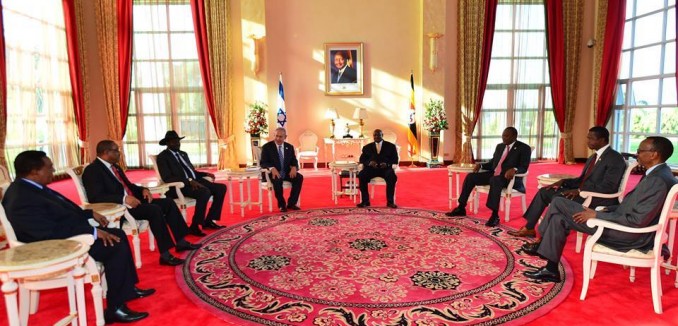On the first leg of his historic trip to Africa on Monday, Israeli Prime Minister Benjamin Netanyahu met with the leaders of seven African nations to discuss opportunities for collaboration in the fight against terrorism.
The heads of Uganda, Ethiopia, Kenya, Rwanda, South Sudan, Tanzania, and Zambia jointly issued a statement along with Netanyahu after attending the summit in Entebbe, calling it “the opening of a new era in relations between Israel and the countries of Africa.”
The leaders committed to “enhancing their cooperation in the fight against terror by sharing intelligence and utilizing new technologies, including in the sphere of cyber security,” according to the statement. Discussions also focused on expanding and deepening regional and bilateral cooperation in fields including “water management, agriculture, medicine, renewable energy and sustainable development.”
The leaders also spoke about upgrading Israel’s standing in the African Union, saying that they “look forward to the African Union promptly re-granting observer status to the State of Israel. This step will reflect the friendship and be mutually beneficial to both parties.”
While Israel was an observer member of the Organization of African Unity until the organization was disbanded in 2002, it was prevented from assuming the same status in the African Union due to protests by then-Libyan dictator Muammar Gaddafi. Despite this, Jerusalem currently has diplomatic relations with 41 African countries and embassies in 11 of them.
Tanzanian Foreign Minister Augustine Mahiga also told Netanyahu during the summit that his country intends to open its first embassy in Israel, the Times of Israel reported.
Upon arriving in Uganda on Monday, Netanyahu commemorated the 40th anniversary of the hostage rescue operation at Uganda’s Entebbe airport, when IDF commandos rescued over 100 Jewish and Israeli hostages held by Palestinian and German terrorists. Netanyahu’s older bother, Lt. Col. Yonatan “Yoni” Netanyahu, was famously the only Israeli soldier killed in the operation.
“I am touched to stand in this place, this very place, where my brother, Yoni, fell,” the prime minister said at the airport. “Entebbe is always with me, in my thoughts, in my consciousness, deep in my heart.”
As his plane approached Nairobi on Monday, Netanyahu told reporters that he views an alliance with African nations as a step toward overcoming the “automatic majority” against Israel.
Netanyahu’s trip to Africa — the latest in Israel’s ongoing efforts to establish and strengthen relations with other regional and global powers — comes just a week after Israel and Turkey reached an agreement to restore full diplomatic relations. Turkey severed ties with Israel after IDF soldiers raided a ship that attempted to break Israel’s legal naval blockade of the Hamas-ruled Gaza Strip in 2010.
Netanyahu is the first sitting Israeli prime minister to visit sub-Saharan Africa since Yitzhak Shamir in 1987.
Landed in Africa. It's been decades since an Israeli PM has visited. I'll be in Uganda, Kenya, Rwanda & Ethiopia. pic.twitter.com/0HOAh3fhgs
— Benjamin Netanyahu (@netanyahu) July 4, 2016
[Photo: Kobi Gideon / GPO]




